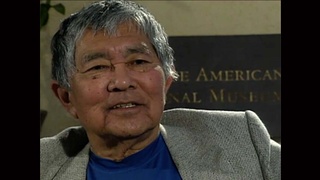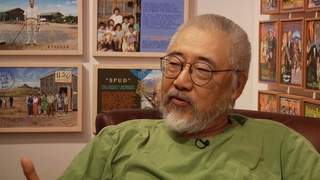Interviews
Arrested in camp for trying to leave
I and Mineta Tonesa were the full, also one of the seven, we uh, walked out of camp. Just trying to see what would happen. And also, this was, I think this was during the period when we hadn’t had meetings, mass meetings. And we wanted to establish that there was no freedom of egress or ingress in camp. And we got to the gate and started walking out and the guard said something like you can’t go out without a pass, this and that. And we argued saying that oh we’re American citizens we didn’t do anything wrong, you know. We put in just going down to the next town. And he says “Well, if you keep walking, I’ll just have to shoot you.” Well, we figured no point in getting shot so we had him arrest us. And we spent the next couple of days at the guardhouse. At the army guardhouse at the camp. Which wasn’t bad, good food, for a change...
Yeah, I think the next, I forget how many days later we had a hearing. In front of Robertson, the director, the WRA director, the camp counsel, the camp security, the outside security, and military police. They had about five or six there, sitting in this horse shoe and we were right in the center there. Getting questioned. And uh, I think you have my question and answers there. (Chuckles). But uh, that’s what we wanted to establish. That if we got into any kind of legal process afterwards we might be of some use. We wanted to show that we were prisoners, that we weren’t uh, you know free. That was our purpose, and that’s what we uh, although it didn’t help us at all at the trial.
Date: May 9, 2006
Location: California, US
Interviewer: Lisa Itagaki
Contributed by: Watase Media Arts Center, Japanese American National Museum









